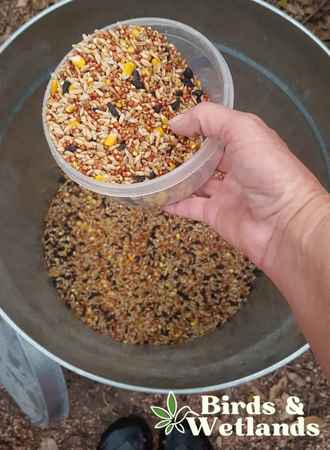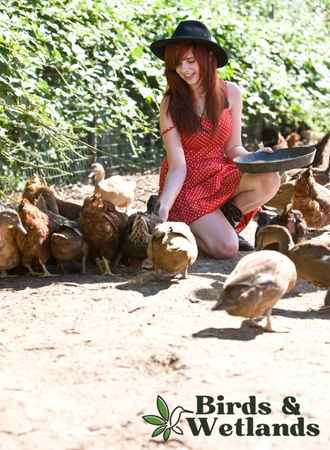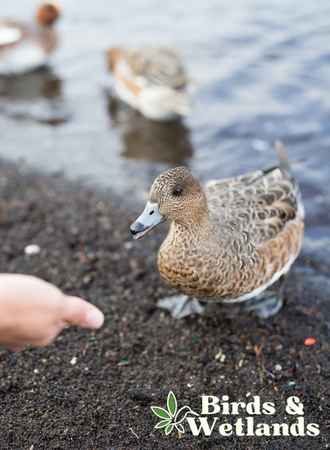Ducks are charming and sociable creatures that love to snack on a wide range of foods. But can they safely consume chicken feed, which is specifically formulated for their poultry cousins?
After all, both animals are poultry, so they would have similar dietary needs.
Can Ducks Eat Chicken Feed?
Ducks can eat chicken feed, but it should not be their primary source of nutrition. Ducks have different nutritional requirements compared to chickens, so relying solely on chicken feed may lead to deficiencies in their diet. If necessary, supplement their diet with waterfowl-specific feed or an all-purpose poultry feed formulated to meet the nutritional needs of both ducks and chickens.
However, it’s important to note that ducks have slightly different nutritional requirements than chickens, and they may benefit from additional supplements to ensure they get all the nutrients they need.
If you want to learn more about feeding ducks and chickens and how to provide a well-balanced diet for both species, keep reading.
Key Takeaways on Can Ducks Eat Chicken Feed
- Ducks can safely eat chicken feed, provided it is supplemented with other sources of nutrition.
- While ducks and chickens can eat the same food in a mixed flock, you should distinguish the difference in dietary needs of the two because they have slightly different diet.
- Ducks can’t live on only chicken feed. A balanced diet, including protein, carbohydrates and vitamins, is necessary to ensure healthy growth in ducks.
What is chicken feed?
Chicken feed is a type of animal feed specifically formulated for chickens’ nutritional needs. It is typically made from a combination of grains, seeds, and other ingredients and is often fortified with vitamins and minerals to ensure that chickens receive a balanced diet.
Chicken layer feed can be purchased from health food stores and natural food stores and is usually sold in bags or bulk.

What is the difference between chicken feed and duck feed?
Raising ducks along with chickens is not uncommon, but you should know that they ducks and chickens eat the same feed. However, there are several differences between chicken feed and duck feed. One of the main differences is the nutrient content.
Most chicken feed are formulated for meat birds and egg production, while waterfowl feed contains more carbohydrates and fats and niacin, a vitamin not found in chicken feed. Niacin is important for ducks because it helps them maintain their water-based lifestyle. Unlike chickens, ducks can’t synthesize niacin from tryptophan.
Another difference between the two feeds is the moisture content. Ducks need a diet with more moisture than chickens because they live in a wet environment.
As a result, duck feed should contain ingredients that are high in moisture, such as corn, wheat, or fishmeal.
Baby chicks may also benefit from wet mash or cereal mixed into their food to help them stay hydrated. In contrast, chicken feed is typically drier and more grain-based.
The size of the grains in the feed can also vary between chickens and ducks. Both types of birds can eat small grains like millet and wheat, but ducks prefer larger grains like barley or oats that provide sustained energy.
It’s important to note that if you raise both chickens and ducks together, it’s best to use separate feeds to prevent the ducks from overeating the chicken feed while trying to meet their nutritional needs.
In addition to their regular feed, ducks can also benefit from occasional treats like fruits and vegetables, but these should be introduced gradually and always supervised. Large chunks of some fruits, such as apples, can cause choking if they are not broken down into smaller pieces first.

Is chicken feed safe for ducks?
Yes, it is completely safe for ducks to eat chicken feed. Both chickens and ducks share feed. But it should not be the only food they eat. Additionally, your ducks should not be eating medicated feed that is not for them because it may cause problems in the ducks’ bodies.
Domestic and wild ducks require a diet rich in niacin, a vital nutrient essential for their overall health and well-being. If they are only given chicken feed, they may become deficient in niacin and develop signs of deficiency, such as bowed legs or enlarged hock joints. If this deficiency is left unchecked, it can lead to weakness and even difficulty walking.
It is important to ensure that ducks get all the necessary nutrients to prevent niacin deficiency. One way to do this is to supplement the diet of your ducks with Brewer’s yeast or vitamin and mineral packets from the pet store. You can also offer ducks seeds from grasses and legumes such as clover and alfalfa, which are high in niacin.
Crushed oyster shells are another excellent option for providing sufficient amounts of niacin and important minerals like calcium that help boost overall health. They also help ducks lay eggs with strong eggshells. Duck eggs with robust eggshells keep bacteria out.
You could also try feeding your ducks vegetables, green snacks and leafy greens which ducks love like kale, spinach, and carrots, which all contain valuable vitamins and minerals that ducks need to thrive. You can also add rolled oats supplemented by a water-soluble vitamin and more protein.
When it comes to feeding ducks chicken feed – or any other type of food – moderation is key. Maintaining a balanced diet for your feathered friends is important by regularly offering commercial feeds and natural foods. Be sure to monitor your duck’s health closely to ensure they receive the proper nutrition and remain well-nourished. Otherwise, they might develop foot and leg problems.
If your birds seem sluggish or listless after meals, switch up their diet and try offering them a different mix of foods and avoid excessive high energy blends.
Taking these steps can help ensure that you are raising healthy ducks.

Can baby ducks eat chicken feed?
Avoid feeding baby ducks chicken feed which is made up of grains, minerals, and vitamins. Chicken feed does not have the same nutritional value as duck starting crumbles that are specifically formulated for a duckling’s diet. Furthermore, chicken feed may contain antibiotics or hormones detrimental to ducks.
For the first three weeks of life, it is recommended to feed ducklings waterfowl starter crumbles to maintain healthy weight. Feeding ducklings with ultra fine feed during this time should be avoided due to choking hazards.
These specially prepared starter feeds contain vitamins, minerals, omega fatty acids, and protein amino acid levels that ducklings require for normal growth. Your aquatic friends also aid in support of their immune system and the promotion of healthy digestion.
Duck starter crumbles can also be adjusted to individual breeds of ducks according to their size, age, and developmental stage to ensure they receive the most nutrient-dense diet possible.
Young ducks or ducklings should only be given chick starter feed for the first two weeks and then moved to lower-protein grower feed until they are about 18 weeks old.
If you’re feeding wild young ducks chicken feed, make sure you choose something that meets their protein requirements. Too much protein can lead to a condition called angel wing, which prevents them from flying and may even kill ducks.
Raising ducklings is a rewarding experience but you should be careful with what you are feeding your domestic ducks.
What are the potential risks of feeding chicken feed to ducks?
Ducks and chickens can eat the same foods but they have their own nutritional needs even though both birds are raised for egg laying or meat production or both.
While ducks eat chicken feed or a broiler finisher diet, it should not the only food in their diet. Ducks eating chicken feed exclusively can adversely affect their health. To begin with, ducks and chickens have different dietary and nutritional needs, meaning that chicken food may need to contain the right balance of vitamins, minerals, proteins and fats needed by ducks.
Also, chickens do not require as much calcium in their diet as ducks. Chicken feed is often low in calcium, leading to many deficiencies in ducks, such as poor bone growth and thin eggshells in laying hens.
Adult ducks might also become malnourished when fed exclusively or primarily chicken feed due to a lack of variety in their diet. Ducks require higher protein levels than chickens and may suffer malnutrition when not receiving enough protein from their diet. Not only can this cause stunted growth, but it can also weaken the immune system making them more prone to infection by parasites, bacteria and viruses.
Ducks are also more likely to develop gout or fatty liver when fed solely chicken feed since it is high in carbohydrates but low in essential fatty acids that they need for proper metabolism.
Furthermore, feeding a duck chicken feed containing grains such as corn or wheat without any other supplementation can lead to both digestive issues and obesity due to the high-calorie content of grains compared to healthy proteins like fish meal or insects that are typically found in duck feeds or waterfowl pellets.
This type of diet may also cause feather plucking since chickens typically don’t require foods with Vitamin A whereas ducks need it for shiny feathers and good vision.

Other Similar Foods for Ducks
| Almonds | Almonds: A Treat for Ducks? |
| Apples | Can Ducks Munch on Apples? |
| Cucumber | Do Ducks Enjoy Cucumber? |
| Grapes | Are Grapes Safe for Ducks? |
| Rice | Can Ducks Eat Rice Safely? |
Best Duck Feed Pellets
Are you a duck owner looking for the perfect feed to keep your feathered friends happy and healthy? Look no further than Purina Duck Feed Pellets! With their nutritionally balanced formula and high-quality ingredients, these pellets are the ultimate solution for providing your ducks with the nutrition they need to thrive.
Pros
- Complete Nutrition: Purina Duck Feed Pellets are nutritionally balanced to provide all the essential vitamins and minerals that ducks need to stay healthy and strong.
- Easy to Digest: The pellets are specially formulated to be easy to digest, which makes them ideal for ducks of all ages.
- Promotes Growth and Development: With its balanced nutrition formula, Purina Duck Feed Pellets are designed to support healthy growth and development in ducks.
- Suitable for All Breeds: Whether you have domestic ducks or wild ducks, Purina Duck Feed Pellets are suitable for all breeds of ducks.
- Trusted Quality: Purina has been producing high-quality animal feed for over 100 years, so you can trust that your ducks are getting the best possible nutrition with Purina Duck Feed Pellets.
Cons
- Cost: Compared to other types of duck feed on the market, Purina Duck Feed Pellets can be slightly more expensive. However, many customers feel that the high-quality ingredients and balanced nutrition formula are worth the extra investment.
- Pellet Size: Some customers have noted that the pellet size of Purina Duck Feed Pellets can be quite large, which may not be suitable for smaller or younger ducks. However, many customers have reported that the pellets can easily be broken up or soaked in water to make them easier to eat.


